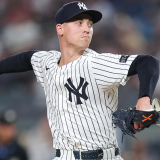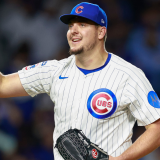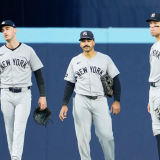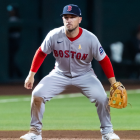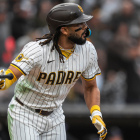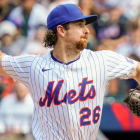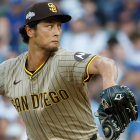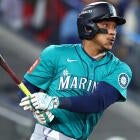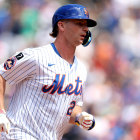Predicting the Contemporary Era Hall of Fame ballot voting for Barry Bonds, Fernando Valenzuela and more
Eight players will be debated during the winter meetings for an induction into Cooperstown
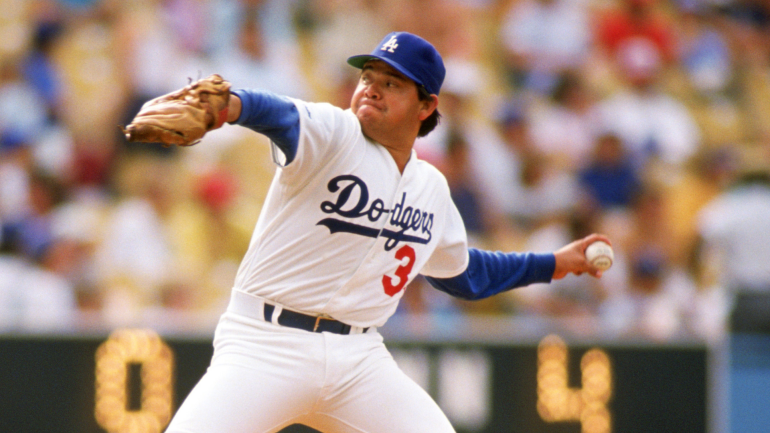
The Contemporary Era Hall of Fame ballot this year was revealed on Monday and it has some huge names. Before we dive in, there's an important reminder that everyone needs to keep in mind: The Era Committee Hall of Fame ballot is totally different than the BBWAA ballot. Last year, the Classic Era Hall of Fame ballot elected Dave Parker and Dick Allen while the BBWAA ballot sent CC Sabathia, Billy Wagner and Ichiro Suzuki into the Hall of Fame, for a five-man class in total.
The Era Committee ballots include players who fell off the BBWAA ballot for one reason or another in addition to non-players like pioneers (Buck O'Neil), umpires (Hank O'Day), managers (Jim Leyland), front office executives (John Schuerholtz) and even commissioners (Bud Selig). The players who fell off the ballot and deserve further consideration sometimes make it, such as the two mentioned above, Fred McGriff, Gil Hodges, Jim Kaat, Minnie Miñoso and Tony Oliva in recent years.
Let's break down each of the eight candidates and offer up a prediction at the end.
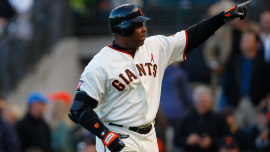
Barry Bonds
We don't need to bother with a stat breakdown. Bonds' stats say he's one of the greatest players in MLB history and there's an argument that he's the greatest. The connection to BALCO in the Mitchell Report is what kept Bonds out via the BBWAA vote and he also received zero votes out of 16 in on the 2023 Contemporary Era ballot. I'm not sure what would be different three years later, but you never know, it could be a favorable panel.
Roger Clemens
Copy and paste what I said about Bonds, sub in "pitchers" for "players" above and move him ever-so-slightly down, as he doesn't have a great argument for the greatest statistical pitcher ever, but he isn't too far off. These two are forever tied together, to the point that they were on the BBWAA Hall of Fame ballot the exact same 10 years. That means, the hunch is they'll either both get in or neither on this ballot.
Carlos Delgado
Delgado unfortunately came on the BBWAA ballot at the wrong time. He was on the 2015 ballot with 13 players who are now in the Hall of Fame in addition to Bonds, Clemens, Curt Schilling, Jeff Kent, Gary Sheffield, Sammy Sosa and, well, yeah. It was just ridiculously crowded and, remember, voters are capped at 10 spots on their ballot. Delgado got 21 votes, which was only 3.8% of the electorate and got him booted from the ballot (the threshold to remain on the ballot is 5%). He deserves a longer look, so here it is.
In parts of 17 seasons, Delgado was a menace with the bat in his hands. He hit .280/.383/.546 (138 OPS+) with 2,038, 483 doubles, 473 home runs, 1,512 RBI, 1,241 runs and 44.4 WAR. Baseball fans and media alike have long loved good round numbers and Delgado fell 27 home runs shy of what could have been an automatic ticket to Cooperstown with 500 homers. Still, 473 ranks 34th all-time. He was overshadowed through the PED era, though we never heard a whiff of any steroid connection with him. He's 55th in career RBI, too.
Delgado topped 30 home runs 11 times, topped 100 RBI nine times and went over 100 runs five times. He went over 30 homers and 100 RBI in the same season nine times, tying him for the 12th-most ever. The only players above him are all-time great power hitters.
Delgado was a bat-only guy, and as a result, the JAWS/WAR system isn't great for the Hall of Fame case. He's 38th in JAWS among first basemen, well below the average Hall of Fame score (he's at 39.4 with the average Hall of Fame first baseman being 53.5). To illustrate where he falls, he's a bit below Mark Teixeira and barely ahead of Adrian Gonzalez.
Jeff Kent
One of the greatest power-hitting second basemen of all-time, Kent hung around on the BBWAA ballot the full 10 years, maxing out at 46.5% of the vote. He won an MVP, made five All-Star teams and won four Silver Sluggers. He finished his career a .290/.356/.500 (123 OPS+) hitter with 2,461 hits, 560 doubles, 377 home runs, 1,518 RBI, 1,320 runs and 55.4 WAR. Though he was never able to win a ring, he hit .276/.340/.500 with nine homers and 23 RBI in 49 playoff games.
Kent was not known as a great defender and that's what hurt his case in terms of the WAR. Still, he wouldn't be a terrible addition on this front. He's 22nd in JAWS among second basemen all time, ahead of Hall of Famers Bobby Doerr, Nellie Fox, Tony Lazzeri and Johnny Evers, among others. He's a touch behind Jose Altuve, Dustin Pedroia and Ian Kinsler and sits below the average current Hall of Fame second baseman, so he shouldn't be a shoo-in either. Lou Whitaker and Bobby Grich, for example, are the ones currently sticking out like a sore thumb in terms of quality selections at second base, but they will be on a different Era Committee ballot, hopefully.
Do the home runs impress you? Kent is the all-time leader in homers among second basemen. He's third in RBI behind all-time greats and Hall of Famers Rogers Hornsby and Nap Lajoie.
Don Mattingly
A mid-career back injury has kept Mattingly out of the Hall of Fame to this point. Through his first eight seasons, ending with his age-28 year, Mattingly was a .323/.368/.521 (144 OPS+) hitter. He'd already racked up 33.3 WAR, 1,300 hits, 164 home runs, 717 RBI and 615 runs. He won an MVP, and also finished second, fifth and seventh in voting. The rest of his career, he only had a 105 OPS+ while averaging 128 games and 1.5 WAR per season.
We're left with a guy who hit .307/.358/.471 (126 OPS+) at a corner infield position. He finished with 2,153 hits, 442 doubles, 222 home runs, 1,099 RBI, 1,007 runs and 42.4 WAR. In addition to the MVP, he was a six-time All-Star, won nine Gold Gloves and three Silver Sluggers.
Among the most statistically similar players to Mattingly through age 28: Freddie Freeman, Jim Rice, Jeff Bagwell and Rafael Palmeiro. In looking at entire careers, the top three most similar players, statistically to Mattingly are Cecil Cooper, Wally Joyner and Hal McRae.
He never got more than 28.2% on the BBWAA Hall of Fame ballot, but the 2023 Contemporary Era Committee threw Mattingly eight of the 16 votes. He's got a shot here, even if his statistical case falls short due to his lack of longevity.
Dale Murphy
Similar to Mattingly, Murphy's prime was glorious, but he didn't compile a bunch and had rough late years. Unlike with Mattingly, it didn't appear to be directly due to an injury ruining his career.
Murphy won two MVPs, five Gold Gloves, four Silver Sluggers and made seven All-Star teams. He led the league in homers twice, RBI twice, runs once, slugging twice and walks once. He finished a .265/.346/.469 (121 OPS+) hitter with 2,111 hits, 350 doubles, 398 home runs, 1,266 RBI, 1,197 runs and 161 stolen bases.
With the JAWS system, Murphy sits firmly in "Hall of the Very Good" territory. He's 27th among center fielders, behind Johnny Damon and Fred Lynn and just ahead of Andrew McCutchen, Bernie Williams and Brett Butler. The top three statistical comparisons are Andruw Jones, Joe Carter and McCutchen, though it should be noted Hall of Famer Duke Snider sits fourth.
Murphy never got more than 23.2% of the vote on the BBWAA ballot, but on the 2023 Contemporary Era ballot, he got six of the 16 votes.
Gary Sheffield
Sheffield has admitted he used "the cream" from BALCO, which was a steroid. He said he didn't know it was a steroid. This is probably the main reason he never got in via the BBWAA ballot. Defensive shortcomings and some off-the-field issues, especially from his Brewers years, also came up.
With the bat in his hands, though, Sheffield was a true artist, starting with baseball's most famous, and scariest, bat waggle. He finished his career hitting .292/.393/.514 (140 OPS+) with 2,689 hits, 467 doubles, 509 home runs, 1,676 RBI, 1,636 runs and 60.5 WAR. His counting stats are the best among hitters here if we ignore Bonds. Sheffield is 70th in career hits, 35th in total bases, 27th in home runs, 30th in RBI, 39th in runs, 30th in times on base and 21st in walks. He walked 304 times more than he struck out in his career, an outlier among power hitters of his generation.
A late surge got Sheffield to 63.9% of the vote in his last time on the BBWAA ballot, but I'm dubious about his chances with the Era Committee in light of the PED baggage. Until we see movement on Bonds, I'm just not seeing a lane for Sheffield.
Fernando Valenzuela
Valenzuela died just before the 2024 World Series and it put a renewed emphasis on his importance in Dodgers history and, frankly, MLB history. I did a dive last December on how death can sometimes, seemingly indirectly, give a little push for Hall of Fame candidates and said I thought it would help get Dick Allen in. It did. In that same piece, I mentioned that I wouldn't be surprised to see Valenzuela on this ballot and that came true as well. I also had this to say:
Knowing what we know now about arm injuries, I also can't help but wonder if we should grant Valenzuela a little leeway in Hall of Fame discussions, given his early workload. From his age-20-26 seasons, he averaged 255 innings and 14 complete games per season. Through his age-25 season, he had a 2.94 career ERA. From age 26 through the rest of his career, he had a 4.23 ERA. Shoulder injuries surfaced in 1987, when he was 26.
Through 1986, Valenzuela was a six-time All-Star with a Cy Young, Rookie of the Year and a World Series ring. He finished in the top five of Cy Young voting four times. He'd never make an All-Star team or get a Cy Young vote again.
In all, though, his career numbers compare somewhat decently with Jack Morris, who made the Hall of Fame via the Modern Baseball Era Committee in 2018. And, again, I think Fernandomania and his impact on Dodgers fans can and should absolutely be part of the discussion. It's a Hall of Fame, not a Hall of only the most elite players who never faltered in their careers.
I think the path is clear right now.
Prediction
There's a yet-to-be-announced panel of 16 people who will meet in a room and discuss the players before casting votes during the winter meetings. Any of the above players would need at least 12 votes to get into the Hall of Fame.
Without knowing the panel, it is incredibly difficult to make predictions. I'll eliminate Bonds, Clemens and Sheffield from the get go. I think it's going to be decades -- if ever -- before the PED-connected players get through a panel. I do think Mattingly, Murphy, Delgado, Kent and Valenzuela will get strong looks from the committee.
I'll say Valenzuela, Mattingly and Murphy get in and those are ordered by my level of confidence in them making it. I'm near certain on Valenzuela and I have a good feeling for Mattingly. I wouldn't be surprised if they go crazy and find a way to get Kent or Delgado in too. If you don't think that's possible, look no further than the 2022 Hall of Fame class. The Early Baseball and Golden Era Committees (yes, there were two that year, but still ... ) inducted six guys.
The class will be anywhere from one to four guys. Valenzuela is getting in while Sheffield, Bonds and Clemens are not.




